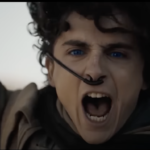Over the last two weeks, the internet has gotten a taste of the long awaited and troubled remake of the 1994 cult classic, The Crow.
Both famous for its Alt-Rock Goth aesthetic and as the final film of Brandon Lee, the motion picture has garnered several terrible sequels that seem to move further and further away from the original vision of James O’Barr’s 1989 comic from publisher Calibur Comics.
Unfortunately, this “remake” is anything but. Save for the main character’s names of Eric Draven and Shelly Webster, and the concept of a vengeance-fueled, reanimated corpse administering Punisher-esque justice, there’s nothing here.
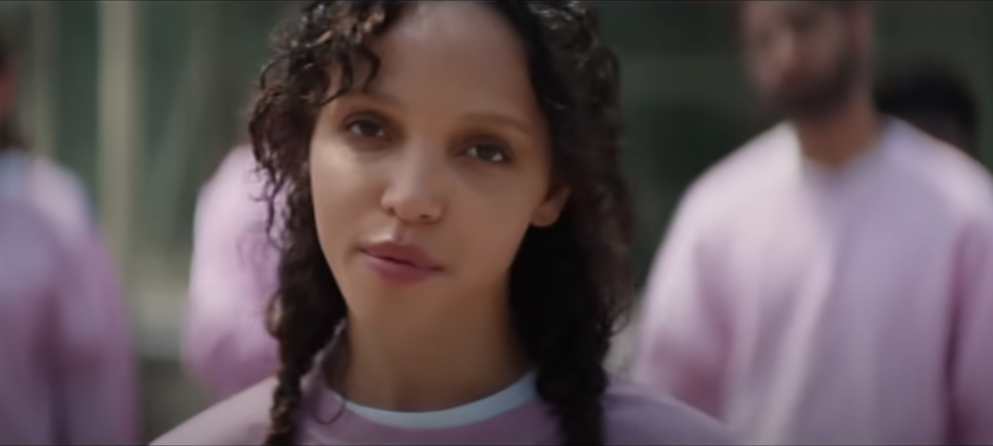
Eric isn’t an up-and-coming rock star. In fact, Shelly and Eric meet while serving sentences at the same prison in this new 2024 version, which is immediately ridiculous and improbable, given men and women serve sentences in separate facilities. And like the other sequels, they over complicate the “magic” behind The Crow, which is quite clear in the trailer.
The 1994 original used it as an aside, and quickly moved on from the hard occult technicalities and focused more on Eric’s pain, as well as the pain of those that suffered after the loving couple’s tragic death. It wasn’t completely about Draven, while he was the hero. As the film went on, he wasn’t just exacting vengeance, but saving those that were lost along the way.
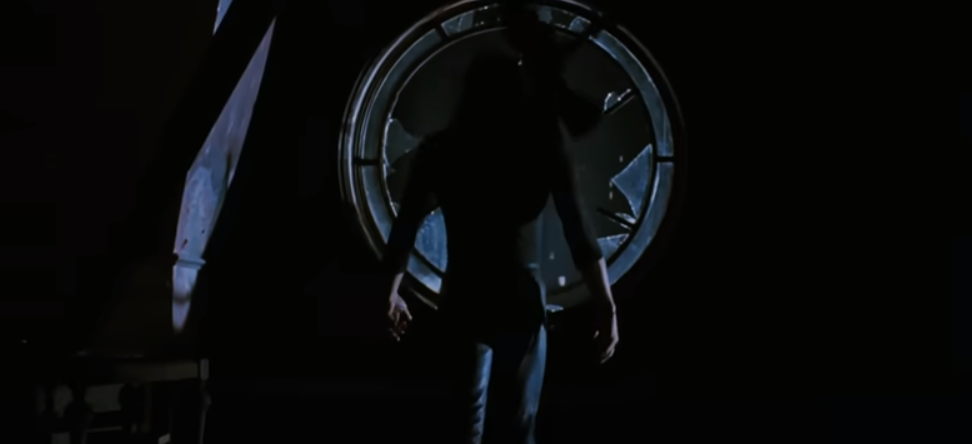
Take, for example, the central reason for Eric and Shelly’s murder: the apartment building. The bad guys of the film run some sort of real estate firm, or corporation, that buys up real estate in the city. Eric and Shelly’s loft apartment sat atop the building and it was the loving couple who helped organize the petition. Eric, a local musician in the 90s, more than likely used his band to bring awareness to the issue, something common for the grunge era.
Their protest was the catalyst for the brutal rape and murder of the couple, a warning to all who would oppose the sale of the building, and one year later, the building remained condemned.
Eric, while brought back to avenge Shelly, ends up having a bigger mission to save the building and families like Darla and Sarah, a mother and daughter who are neighbors of Eric and Shelly. Sarah, the tough skating teen, is someone who tried to help Eric through the film, since they were more parents to her than Darla, who is a heroin addict.
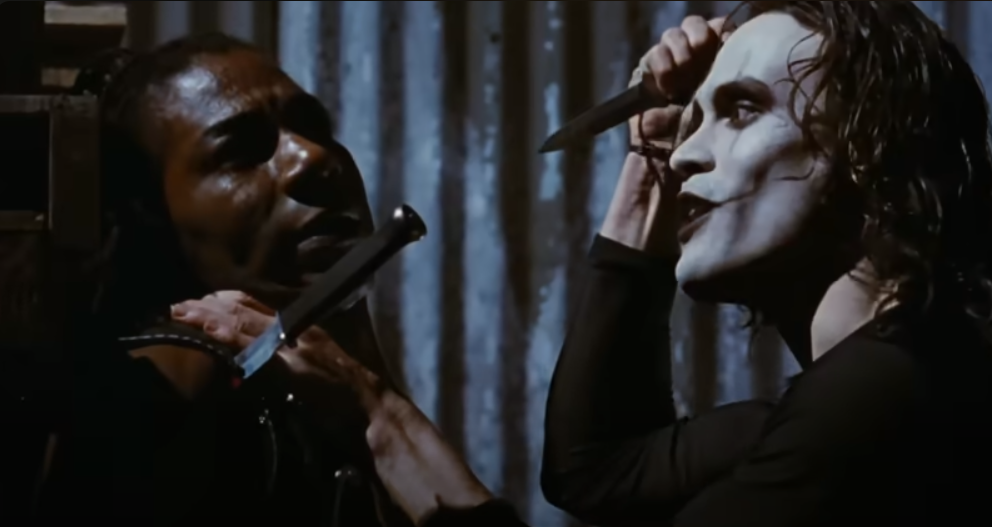
While Eric hunts down the killers with more Punisher vibes than John Wick (like the new trailer), he also inadvertently heals the people affected by the heinous crime. The men were goons that are basically employed by the corporation to cause havoc in the city for property owners, effectively blockbusting for their own personal gain. They caused a lot of damage.
For one, the police officer, Sgt. Albrecht played by the legendary Ernie Hudson, stayed with Shelly Webster the entire 30 hours she was in intensive care. It’s through his eyes and memories that Eric can see her last moments. And it’s their murder case that, when he dug too deep, got him demoted to essentially traffic duty for the foreseeable future. Darla hooks up with Funboy, one of the murderers, after she has nowhere to go, making him the evil stepfather of Sarah and causing even more pain.
The crime had a realistic butterfly effect. It’s not just the immediate victims here, we’re talking about an immense amount of damage to the local community. It shows how much violence affects society.

And Eric isn’t some unfeeling killing machine. Yes, he gives off Joker energy just like Bill Skarzgard does, but he also has some incredibly powerful scenes. The first that comes to mind is how Eric magically pushes the heroine out of Darla’s veins after saying “Mother is the name of God on the lips of their children,” reminding her how she has failed her daughter. She runs into the streets and the rain to find her again.
How about when Sgt. Albrecht gets a visit from Eric earlier in the film. After Draven receives the painful last moments of Shelly, he takes a cigarette the cop was smoking and tells the officer how Shelly and Eric would get hung up on trivial things too, but how little they mattered now, giving the jaded policeman pause, before Eric puts out his cigarette saying “you shouldn’t smoke, these’ll kill ya!” With a little giggle.
Sarah visits Eric and Shelly’s loft again, both for investigative reasons and personal ones. Her happiest memories were with them in this place. It is here that Eric reveals himself and says something he always told her that she held onto forever: “It can’t rain all the time.”
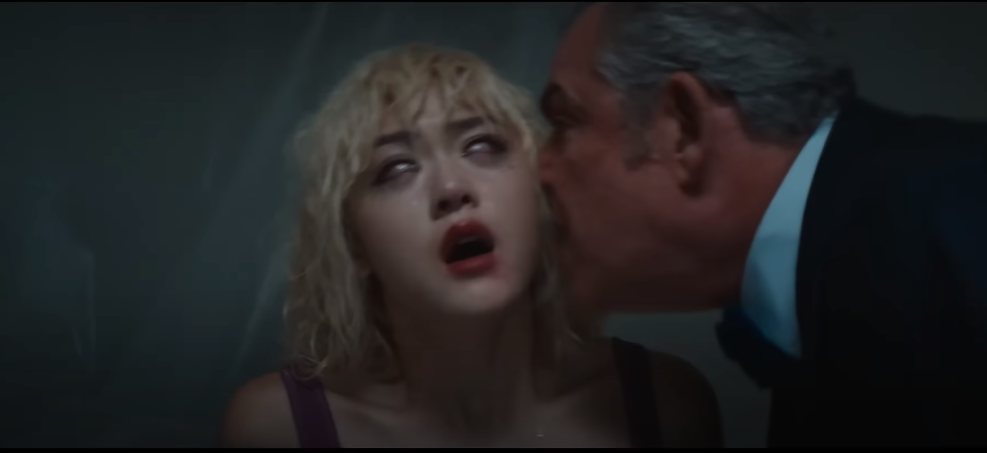
The new film takes out these secondary items and implants some corporate influence, but it appears to be more of a demonic cult, something that is less important in the original film, and really has nothing to do with the murders. Here, Shelly was randomly on the street and saw some sort of sacrifice. These occult vibes are common with the subsequent sequels and Crow Franchise, which is a big red flag. It makes it have more in common with The Crow: Wicked Prayer, which is by far the worst one.
The couple are murdered together and are left for dead, and it is here that the trailer takes us to the monochromatic afterlife, an old floating industrial complex blown apart by cosmic energies and surrounded by several murders of crows. Our new Draven isn’t a rockstar, but a tattooed antihero convict. And, for no reason at all, appears to have some sort of respawn mechanic that feels more like he’s in a video game.

And make no mistake: this has edgelord gamer vibes. This take of Draven is one where he’s stuck in a Rougelike boomer shooter and his favorite movie is David Ayer’s Suicide Squad. Draven has a tattoo on his chest that makes his nipple a crying eye. He has a centipede crawling up his Fight Club abs.
They may, at least from the trailer, focus more on Eric and Shelly’s relationship in the beginning in reference to 1970s revenge horror films like The Last House on the Left or ones more recent like Nicholas Cage’s Mandy. This could make their relationship feel more genuine, but I’m not fully buying the chemistry between the two here.

And by taking the conflict and making it more about the couple, which every sequel seems to do (save the first sequel, The Crow: City of Angels), it can make it feel more personal, but the film doesn’t need to. This causes many to worldbuild to give a sense of scale, but most of it only serves to make the story less personal and more mystical.
I, for one, won’t be seeing the new remake. I am clearly a fan of the original for a lot of reasons. But if these studios plan on remaking or trying to tackle this series and make it a franchise, they need to change the focal point. It’s not about Eric and Shelly. It’s about Eric and Shelly being a symptom of a larger societal injustice that needs to change, whether it’s corporate greed or a numbness to mass violence. In this day and age, that’s harder to do without causing a ruckus or being accused of just trying to make a moral buck. But trying to remove it completely is what is making The Crow worse. I know it’ll come to pass. I know we’ll see a good take on this franchise once more. Even if it’s when I’m 60.
Because it can’t rain all the time.


